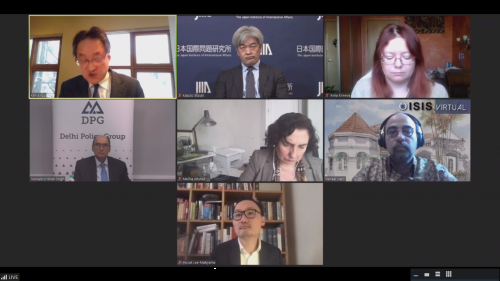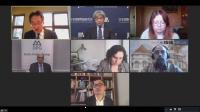Remarks by Ambassador H.K.Singh at the 3rd Tokyo Global Dialogue
The 3rd Tokyo Global Dialogue
”Contested Values, Technologies and Oceans:
Intensifying US-China Competition and International Response”
March 2-3, 2022
Panel on International Response: Values and Technologies
Remarks by Amb. H. K. Singh, Director General
Question 1: How do you see the US-China systemic competition over values and technologies and their impact? What other Agenda/development will have a significant impact on the international values/technologies relations.
- Let me begin by saying that developments in Ukraine have cast a deep shadow across the globe, and severely undermined the principles of sovereignty and territorial integrity. This has showcased once again the need for a reformed multilateralism, taking into account the contemporary realities of growing multipolarity and power rebalancing.
- The theme of this conclave suggests that the US-China clash is over their political systems and values, and is a contest between democracy and authoritarianism. This is a flawed assumption, because till very recently these two countries have been close partners, especially in the economic and technological domains, and there is nothing new about China’s political system. They still espouse a degree of mutual accommodation.
- The real driver of this competition is China’s desire to displace US primacy in Asia and globally, which in turn arises from Beijing’s perception of declining US influence.
- Universal values and democratic pluralism indisputably matter as the hallmarks of free and open societies, but what matters more is self-interest. Values have little to do with great power competition or statecraft. It is in the very nature of great powers to shape world order, aggrandise their influence and interests, pursue power politics, resort to unilateralism and coercion when expedient, and seek domination through alliances and spheres of influence.
- The US-China equation is no different.
- All nations enjoy the sovereign right to choose their own governance systems. China argues that its authoritarian system is effective and delivers results. India on its part is completely aligned with universal values and democracy. But we can also respect “Asian values” (which lay emphasis on collective rights and respect for authority), that others societies in Asia may subscribe to.
- US-China competition on advanced technology, and the attempts of each at gaining technological dominance, can hardly be described as “values based differences” over technology.
- This competition is about commanding the heights and deriving strategic rents. It also needs to be seen in a wider context – that of risks to national economic security and resilience arising from trade, technology and supply chain over-dependence.
- China has long been supported by the West to become the world’s factory, with arguments of economic efficiency overriding strategic interests and undermining geopolitical stability.
- National security cannot be measured by margins of profit. There is no case for conducting business as usual with a belligerent and expansionist China.
- It remains to be seen how recent trends towards preserving the global pre-eminence of the Western-led order will be perceived in Asia at a time of global power rebalancing and increasing multi-polarity. This is especially so as Asia is home to its own ancient civilisations.
- It is simply wrong to assume that the West is the sole custodian of democracy or has a monopoly over values. The historical record of the last 30 years shows that attempts at imposing Western values across the globe have invariably failed. And the West’s own record of living by its values is not great.
- In my view, with its still rather recent colonial history, Asia does not need either a liberal imperium or an authoritarian one. Regional stability requires an inclusive Indo-Pacific order sustained by multipolar consensus.
Question 2: In what ways is US-China competition over regimes and governance related to future technological developments? How would you calculate costs and benefits of their rivalry for your own country?
- As I have mentioned earlier, US China competition is not about values and governance.
- US trade sanctions and export controls aimed at China are targeting key technologies vital for the realisation of China’s 2025 and 2049 goals. However, as of now, the challenge to China remains marginal.
- Technology obtained from democratic countries has further enabled China to more intrusively surveil and control the lives of its people. China has created a closed digital space which is decoupled from the world.
- Unquestionably, cooperation among democracies on technological standards needs to be scaled up with some urgency.
- The absence of universally agreed ethical laws, guidelines and regulations related to biotechnology, genomics and artificial intelligence poses a grave threat to the future of mankind. If the current apathy on these issues continues, given its track record, China will continue to act in manner that vastly magnifies global security risks.
- In India’s case, the policy response is clear: calibrated economic decoupling from China to reduce vulnerability to the “weaponisation of interdependence”. India has made the strategic choice to stay away from the China dominated RCEP trade pact. It has banned all Chinese digital applications, curbed the role of Chinese companies in vital areas like telecommunications infrastructure, and incentivised domestic production in areas ranging from electronics to pharmaceuticals, semiconductors to renewable energy and electric mobility.
- We are clear and determined that trade must not jeopardise national self-reliance in critical technologies and secure supply chains.
Question 3: What have been the responses by your country/ or region or by the international community. Are the current policies valid and adequate, if not what are the reasons? What else should be done?
- While the crisis in Ukraine is monopolising the mind-space of the Euro-Atlantic, China’s expansionism continues unabated and imposes unilateralism, brute force and coercion as the primary geopolitical determinants in Asia.
- China has long derived unfair advantage of the open global trading system, reaping benefits from free market economies but failing to reciprocate.
- For all its rampant disregard for the global rules-based order, China is yet to be held accountable. Meanwhile, it will surely welcome the significant diversion of the US security focus to Europe.
- The Indo-Pacific is a new strategic framework, which has brought together major maritime democracies of the Quad in an effort to counter China’s vision of a Sino-centric Asian order. India has strengthened its partnerships with like-minded countries. However, in the final analysis, India will have to deal with its security challenges from China on its own, just as South East Asian countries will have to contend with China encroaching on their interests.
- Finally, irrespective of what may happen in Europe, power rebalancing towards the Indo-Pacific will continue. To retain its primacy, the US will need to remain a resident Indo-Pacific power, and not recede into the background as an offshore balancer.
- The US and China may espouse different values and systems, but their strategic competition for regional dominance will be played out less on values and more on the ability of the protagonists to mobilise resources and coalitions effectively.
====



